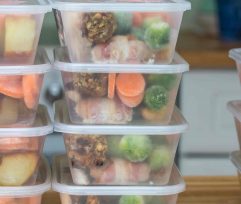Running a marathon is a full commitment from your training schedule to your body’s everyday dietary needs. I’ll be running my 5th marathon in San Francisco later this summer. Here’s what I’ve learned about the importance of a dietary plan in conjunction with a training schedule for optimal race performance and physical well-being during the process.
 Race weights and diets vary a lot from runner to runner. Your goals determine what your diet should be, and maintaining health and strength is the ultimate priority.
Race weights and diets vary a lot from runner to runner. Your goals determine what your diet should be, and maintaining health and strength is the ultimate priority.
- 55-65% of your intake should be quality carbs
- 10-35% of your intake should be lean proteins. I prefer HIGH protein intake (35%-40%) for maximum muscle recovery
- 20-35% Unsaturated fats
High Quality Foods are things like whole grains, lean proteins, veggies, GREENS, black beans, eggs, eggs, eggs. And, did I mention eggs? Eat dairy in moderation if you can. Some good unsaturated fats are nuts, almonds, walnuts, olive oil, coconut oil, potatoes, etc. Find what you like. No one likes eating things that taste nasty, so find thing you enjoy and stick to it!
Healthy weight loss for race weight:
- Healthy weight loss for a intermediate runner is roughly 0.5 to 1 pound per week. That equals 3 shoeboxes of fat over a 16-week training schedule.
- Listen to your body. If you are hungry, eat. Do not deprive your body of the nutrients it craves. Just make sure you are eating good quality food.
- Healthy weight loss through training can help reduce stress on joints and also reduce finish times up to 15 minutes faster than planned
Calculating amounts of calories burned per run:
Have your caloric intake slightly negative compared to what you are burning
- In most long run cases, you will feel like you are full anyways. It’s almost impossible to not feel full off tons of quality dense foods with lower caloric levels after a 16 mile run!
- Rule to follow:
0.63 calories x ___miles run x ____pounds
- Use this rule as base to determine how much you burn daily, and use this to estimate your intake to fit slightly under.
- Don’t forget to listen to your body. That doesn’t mean give in to your craving for junk. That means use your food wisely, and eat when you you are hungry. But don’t over indulge. Know what you are eating, and how much of it you are eating.
Pre Run Snacks:
 Do it. Just do it. I know a lot of runners say they hate to eat before a long stride, but your body will thank you for it. An ideal snack for long distance (saturday/sunday runs) would be half of an english muffin with a tablespoon of peanut butter and banana slices
Do it. Just do it. I know a lot of runners say they hate to eat before a long stride, but your body will thank you for it. An ideal snack for long distance (saturday/sunday runs) would be half of an english muffin with a tablespoon of peanut butter and banana slices
Use recovery days for caloric restriction:
- NEVER restrict your calories on your long run days! Your body needs to recover, and needs micronutrients to repair the muscles you have been exhausting.
- Keeping your energy up by carb intake during your long runs will help you maintain your hunger. Finish your long run with protein directly after.
Figure out what your “caloric nemesis” is:
- We all have one. That nasty habit that is filled with empty calories that do nothing for you. Most runners will say it’s liquids.
- Cut the mochas, go for the black coffee. Cut the snickers, go for the dried fruits. This will help you stay more full off of the good stuff, and not waste your killer runs on a little stress and craving
Take away points:
- Eat the foods you enjoy, and allow a few “cheat foods” to give yourself a kick. Keep the discipline, don’t over indulge.
- If you have to cheat, try and focus on doing after you have hit the daily nutrients needed.
- I try and focus on my needed nutrients earlier in the day and then focus making sure to fill my calories by the evening.
- Drink water (and moderation of quality sport drinks) religiously. If you think you have had enough, you haven’t. Have more water. 😉
- Write down everything. It will help you stay on track.
- Just listen to your body. Do NOT starve yourself, you are always your best judge on how your body is feeling and what you need.
- Find what works for you. Everyone’s skill, endurance, and fitness levels are different find something that keeps you building strong muscles and increasing miles while staying healthy and on track!




